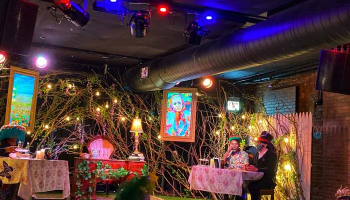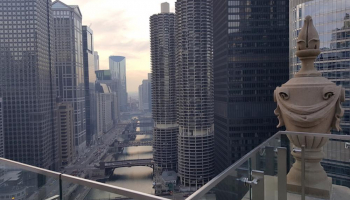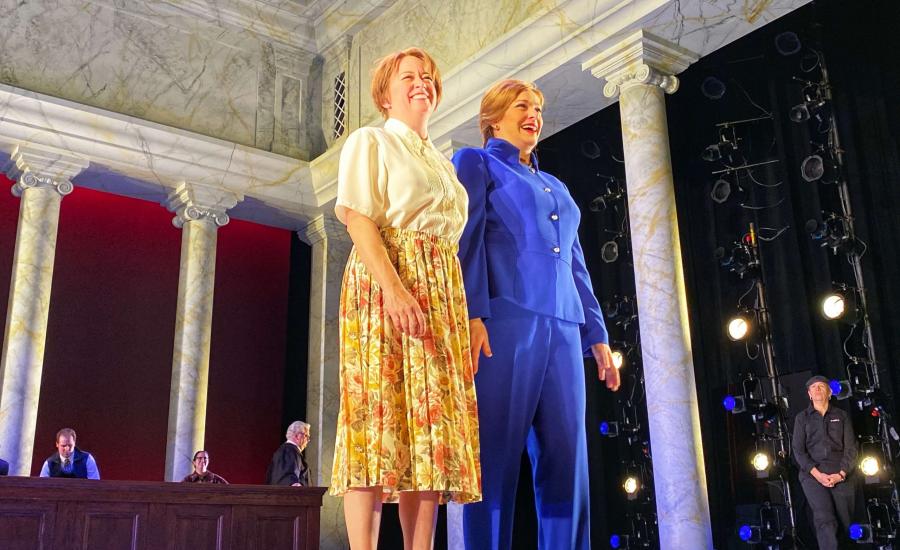
Roe played at the Goodman Theatre, January 18th to February 23rd.
I think I speak for everyone when I say the world has probably never been as divided as it is today. No matter if you’re for or against the current administration, the constant state of nervous conditions we’re facing every single day is simply exhausting.
But I’m in my early 30s, so what I see and experience is now is the apogeum of division and dissent.
Watching the amazingly crafted play Roe (you guessed it–it’s about Roe versus Wade) made me realize that, in fact, the world has always been divided and the fundamental decision allowing American women the right to control their bodies may very well have been more controversial than anything before–and probably even after–1973.
In Roe, what I find truly fascinating is how playwright Lisa Loomer and director Vanessa Stalling turn controversy into art, playfully leveraging humor and visceral images at the same time, to really tell a story–a very powerful one–about the plight of reproductive rights. It’s a tale that spans over half a century.
And what I find most commendable is that they do so by crafting a thorough and unapologetic picture of every major character in this saga.
Chicago being Chicago, you also expect stories to be told through a singular lens–yes, the ultra-liberal one. That is not necessarily a bad thing, but you learn over time that you have to filter the political discourse from the action, so to speak, if you want to really make sense of a story.
Not with Roe.
The play is shockingly balanced in portraying the characters as impartially as possible.
Just like historians who go through rigorous training–some eight years of PhD misery, to be exact–to create balanced, multifaceted narratives out of historical events, Loomer and Stalling go beyond the “minimum viable requirement” of narrating a historical event.
Together, they show the divisive nature of human behavior, with very limited bias and a tremendous amount of professional curiosity. And that’s what makes this play worth watching.
Fairly close to the beginning, one of the main characters Sarah Weddington (played by Christina Hall) poses two single but astute questions. ‘How many of you guys have heard about Roe versus Wade?’ Naturally, virtually everyone in the audience raises their hands.
But then she asks: ‘How many of you really know the story behind Roe versus Wade’? Outside one lady in the fourth row who raises her hand in the air and endearingly gets called out by Hall, the other hundreds of others seated in the audience remain silent.
And that says something.
It says something because the majority of the audience–the wide majority by far–are people over 50. At least, they were when I attended.
I’m not asserting that being in my 30s gives me an excuse to be oblivious to it. I’m saying much of the audience would have been between ten and twenty years old at the time of the historical decision. So, wrongly or not, I’d have expected them to know and remember a lot more than I do.
From this question on, the play is designed like an anthropology book, but one I actually would enjoy reading, or–in this case–watching. I should know since I was on track to spend my life and career in anthropology.
And it goes something like this.
Let me tell you a story, from different points of view. And I don’t care if you agree or not with me. I will tell you the story in a piecemeal fashion, with its good and bad, ugly and beautiful parts and then toward the end, you can make up your mind about the topic.
And the beauty with Roe, the play, is that it doesn’t just tell you a story.
It makes you think about so many more other stories, facts and decisions sneakily chipping away at our collective personal freedoms. And it does so in a subtle fashion, so that you never realize what you are about to lose–or what you have just lost.
And that is Roe, a historical dramatization of events where humor and awkward moments are closely intertwined, covering everything from where the Roe versus Wade started, as a struggle, to where we are today, in 2020.
Literally, one of the references made toward the end of the play talks about the 200 Congressmen who asked the US Supreme Court to reconsider Roe v. Wade on January 3rd 2020.
In the beginning there were Norma McCorvey and Sarah Weddington
In the first twenty minutes of the play, we are introduced to the main historical characters of Norma (played by Kate Middleton) and Sarah (played by Christina Hall).
Norma, the pure definition of “white trash” is desperately trying to get by, despised by her mother, who takes away her first-born because she can’t bear the thought of her “queer” daughter (character’s word not mine) raising her daughter. And then there’s Sarah, a young and ambitious lawyer who wants to make a stand for women’s rights.
Their paths cross, just as in real life, when a pregnant Norma talks to a local lawyer about getting an abortion, which was illegal at the time.
The lawyer declines, but refers her to Sarah and Linda Coffee, (played by Meg Warner), the other attorney in Roe versus Wade, who consciously decided to stay out of the public eye after the historical decision. Because of this, virtually no one knows she existed. The two young attorneys want to challenge Texas’ anti-abortion law.
After Norma agrees to be represented, the judicial process takes its course and the decision is overturned at the state level but the governor refuses to comply, still making a doctor’s act illegal in performing an abortion, therefore rendering the court win a moot point.
On the other hand, by then, Norma is in her second trimester, so already in a place where no doctor would ever perform an abortion.
But during this time, we get a nuanced view of where Norma is at. She is sleeping in public places, doing drugs at six or more months pregnant. The lawyers eventually track her down and get her consent to file a petition for their case to be heard by the Supreme Court, even if she could never get an abortion for herself.
In parallel, we see Norma meeting Connie Gonzales, her life partner for the next twenty years. Connie is an incredible character, played by actress Stephanie Diaz with an amazing amount of grace and passion.
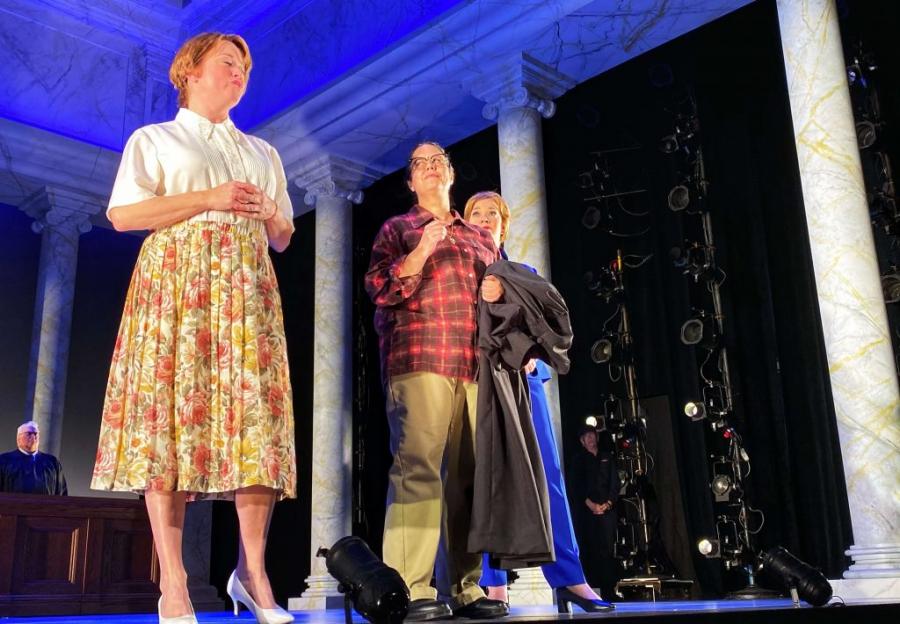 Just as in real life, she is balanced, loving and forgiving. She is Catholic and a lesbian, and turns out to be a pillar in Norma’s life, patiently helping her along the way, no matter how many chameleonic shifts Norma has to go through.
Just as in real life, she is balanced, loving and forgiving. She is Catholic and a lesbian, and turns out to be a pillar in Norma’s life, patiently helping her along the way, no matter how many chameleonic shifts Norma has to go through.
The first act ends when Norma is in her kitchen with Connie, learning from the newspaper that she won the case. And she reveals to Connie that she is Roe.
What is utterly beautiful is that the play could have ended with this scene, and still would have been a masterpiece. The actors did their job and kept the audience engaged. In that hour, we had all learned more about Roe versus Wade than in our lifetimes.
But the stroke of genius is that the story doesn’t stop. The second act covers everything that happened from 1973 till the present time.
The messy truth post Roe versus Wade
The Second Act reveals how both Norma and Sarah’s lives take a turn for the better. Book deals. Movie deals. Interviews. Public service and a professorship for Sarah. The whole shebang.
And we also get to learn about the entire mess that followed.
In the American imagination, the story of Roe versus Wade is very simple. A woman deals with an unwanted pregnancy. She wants to terminate it. It should be her choice, not the government’s. And that’s what the Supreme Court decision helped pave for the next forty-seven years.
But nothing is ever that simple.
On one occasion, where life beats fiction, Norma goes on to first become a volunteer at the Aaron Women’s Health Center abortion clinic, to a born-again Christian, to someone actively campaigning against the Supreme Court Decision that made her famous.
At the abortion clinic, she meets Flip Benham, an evangelical minister and National Director of Operation Rescue, played by the very talented actor Ryan Kitley.
Eventually, she joins his ministry and gets baptized. And in so doing, she joins a movement designed to chip away at Roe versus Wade, an ongoing legal, ideological, divisive struggle.

As the play continues, so does the drama. We are fast-forwarded to the 1990s and then 2000s and then to the present times.
With each decade, the division becomes more prominent, the arguments more intense and the characters more entrenched in their beliefs.
One thing that’s for certain is this. The play is beautifully uncomfortable not just because of the main cast. Every single actor in the piece contributes heavily in one way or another.
Kirsten Fitzgerald makes for a perfectly hateable Mary (Norma’s mom). Ryan Kitley’s Flip portrayal is chilling, out of place with today’s sensibilities, at least in major cities across the US. Yet at times, Flip is almost likeable.
John Lister as Justice Blackmun (and many other smaller roles) provides the much-needed comic relief in an otherwise tense play. Mura Kidwell compellingly portrays “the other side” we don’t like to talk about: women who are pro-life, and in this country, there are plenty!
I’ve rarely seen such an engaging yet tough-to-watch story unfolding gradually and methodically in front of my eyes. From the script–which is beyond brilliant–to the cast which is beyond convincing, this entire play really gels.
A great story unfolds in front of your eyes.
But what makes it all so compelling is that the story is not only great–it is terrifying.
As we all know, Roe versus Wade MAY actually be overturned with the new Supreme Court.
Many states have passed laws that severely restrict women’s rights to have access to reproductive health.
With the current administration’s full-blown war against Planned Parenthood, even if the law stands, it means very little as more clinics are shut down anyway due to lack of funding and access to abortion services becomes less and less feasible.
In Louisiana where Norma was born, in 2020, there are only two doctors who can legally perform abortions outside a hospital per CBS News.
So this is not a happy play, and nor should it be. It’s not a fulfilling play. It is a wake-up play, above all else.
Toward the end, it shows the sobering reality that pastor Martin Niemöller captured beautifully after the Second World War:
“First, they came for the socialists, and I did not speak out—
Because I was not a socialist.
Then they came for the trade unionists, and I did not speak out—
Because I was not a trade unionist.
Then they came for the Jews, and I did not speak out—
Because I was not a Jew.
Then they came for me—and there was no one left to speak for me.”
In a way, I so wish this play had been made years ago, when we were deciding the future of this country without realizing it, in choosing our current president.
Maybe back then, we had a say, not just about Roe versus Wade, but in general.
The play does end, strongly and powerfully, with Sarah’s optimistic words, “ For now in 2020, Roe versus Wade stands”.
But while most of the audience stands up and claps at the talented actors and the brilliant script, myself included, all this daunts me.
For how long will it stand? And are we not doing too little too late? What else can realistically be done to stop the current wave of anti pro-choice legislation?
But that’s NOT a question this play–or any play–can answer.
Still, it’s exceptionally clever that it made me wonder.
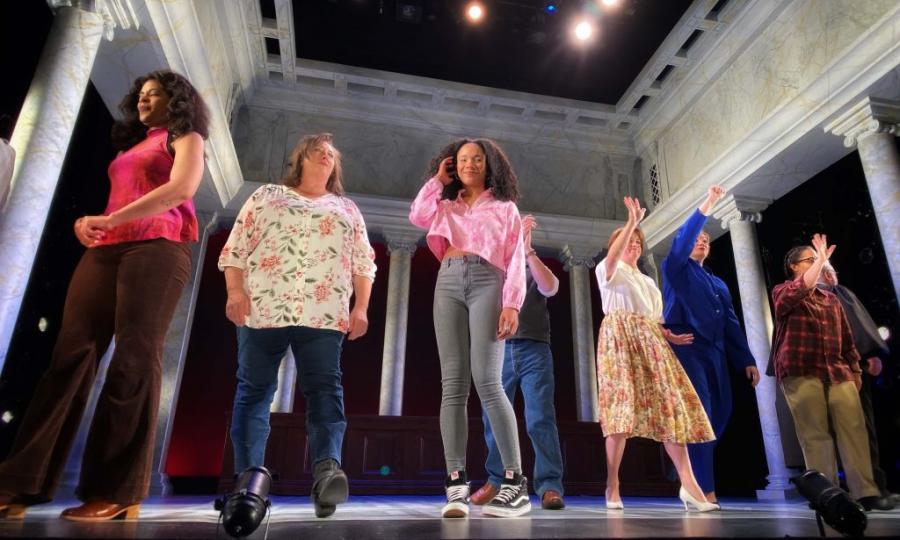
Also check out: The Best Shows in Las Vegas in 2020.



